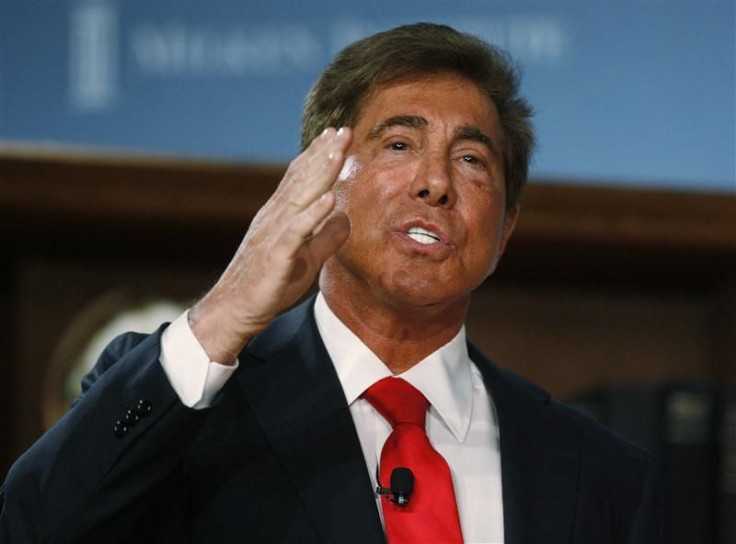Wynn downplays SEC inquiry, hits Okada claims

Wynn Resorts Chief Executive Officer Steve Wynn played down a U.S. regulatory inquiry into a company donation at the heart of a bitter legal battle embroiling his $15 billion casino empire, hitting back at his largest shareholder and accuser in a memo to employees.
On Monday, Wynn Resorts said it had received a letter from the U.S. Securities and Exchange Commission asking it to preserve information about any company donations as well as details of its gaming licenses in Macau.
Wynn, 70, sent a memo to employees in response to the informal SEC inquiry. This marks the latest twist in a high-profile spat between the Las Vegas tycoon and Kazuo Okada, a Japanese businessman who made his fortune in pachinko machines, that has implications over future control of Wynn Resorts.
In the memo obtained by Reuters, Wynn said his main investor and former best friend had defied the wishes of the company's board by developing a casino project in the Philippines. He also defended Wynn Resorts' $135 million donation to the University of Macau, saying it complied with all applicable laws and regulations.
Wynn, who is widely credited with reinventing the modern Las Vegas strip, added that Okada had only voted against the donation because of the duration of the payments, to be made over 11 years, and not because of its propriety.
Okada, an engineer by training who got his start fixing jukeboxes, has one of four licenses for a casino in the Philippines that Wynn says is at the core of the tussle.
Wynn reiterated this in the memo and said his business partner of 12 years had become a competitor.
In breaking ground recently on his Philippine project, Mr. Okada not only defied the wishes of the board, he became a significant new competitor, he wrote in the memo.
A spokesman for Okada had no comment on the SEC inquiry.
The SEC inquiry is a first for Wynn Resorts, which some analysts say has a cleaner track record than rivals such as Las Vegas Sands Corp.
Las Vegas Sands' operations in Macau, the world's biggest gambling hub, are being probed by the SEC and the U.S. Department of Justice -- with allegations of potential illegal dealings with a public official.
Okada, who owns more than double the stake of Wynn Resorts held by its namesake, highlighted the donation in legal filings, saying it was inappropriate since the university sits on government land.
Macau, the world's largest gaming market, is critical to Wynn's profits. The company accrues the bulk of its revenue from its Wynn Macau subsidiary on the back of unflagging demand from wealthy Chinese gamblers.
The tiny former Portuguese colony, situated on the tip of China's southern coast is the only place in China where citizens are legally allowed to gamble, resulting in revenue that dwarfs Las Vegas at least five times over.
PHILIPPINES COMPETITION
Okada, who is developing the $2 billion casino resort in the Philippines, is chairman of Universal Entertainment Corp, an arcade-game manufacturer in which Goldman Sachs Group Inc has an 11 percent interest.
Universal is the largest shareholder in Wynn, with a stake of 19.7 percent and the owner of the Philippines project.
Okada, a Hong Kong resident whom Forbes said was worth $2.1 billion in 2011, has also said he plans to nominate four Wynn Resorts director candidates, a move that could potentially give him substantial control of the board.
Okada's Aruze USA Inc, a unit of Universal Entertainment said in a filing to SEC on January 18: Pursuant to Section 2(a) of the Stockholders Agreement, Mr. Wynn is required to endorse and vote his shares and Ms. Wynn's shares in favour of nominees designated by Aruze that represent a minority of the board.
Wynn, in his memo, said Okada had taken steps to publicize his efforts by hiring a publicity firm in the United States.
In light of the media attention that Mr. Okada has recently generated, it is not surprising that his disagreements with the company have caught the attention of regulators, the memo said.
Shares of Wynn Macau closed up 1.7 percent, outperforming casino peers and the benchmark Hang Seng index, which was up 0.2 percent. Wynn Resorts shares were down 0.4 percent at $109.62 in morning Nasdaq trading.
A source close to Wynn said that while the donation amount seemed like a lot, the amount Wynn Macau pays in gaming taxes is far more substantial and puts the donation in perspective.
Wynn Macau paid $1.85 billion in gaming taxes to Macau last year, he said. That's billion with a B. Okada is raising questions about a $10 million donation to a school?
The donation consists of an initial payment plus annual installments of about $10 million over the 11 years.
It is not unusual for casino tycoons to make donations to Macau institutions.
Lui Che Woo, chairman of Macau casino firm Galaxy Entertainment, and Stanley Ho of local gaming giant SJM have both made payments to the University of Macau, but have done so through their own personal funds.
(Reporting by Ron Grover in Los Angeles and Farah Master in Hong Kong; Editing by Lisa Von Ahn)
© Copyright Thomson Reuters {{Year}}. All rights reserved.





















